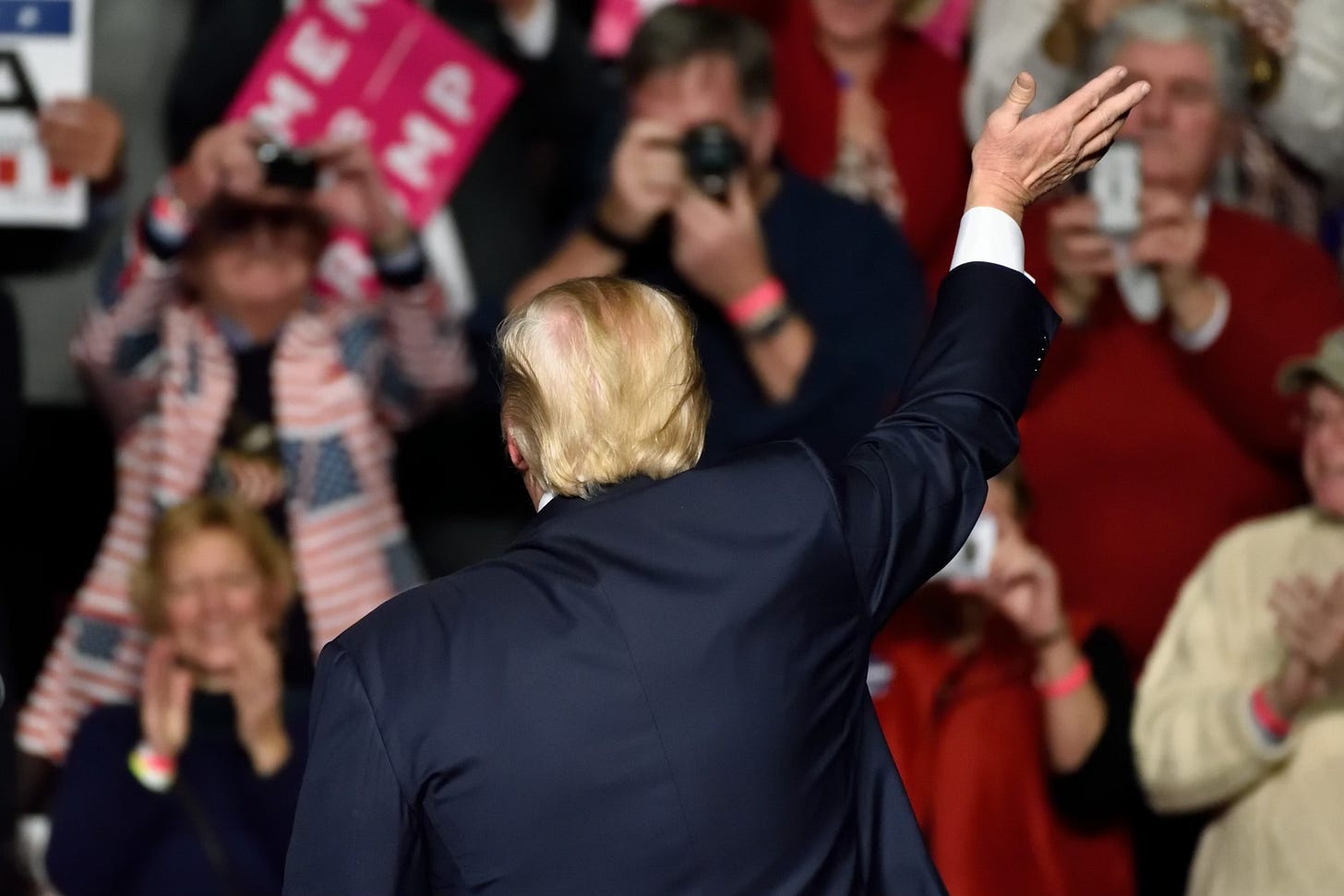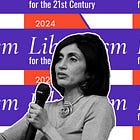Why Populism and Authoritarianism Go Hand in Hand
Populism is not anti-elitism, it is raw majoritarianism exercised via a strongman
I am often asked why The UnPopulist is so focused on populist forms of authoritarianism. Fighting authoritarianism is one thing. But why get so worked up about populism, a view that claims to put the people more in control of governance? Isn’t that how it should be in a democracy?
It is a fair question. But the reason we give special attention to populism is because the logic of authoritarianism is itself built into it, and because this form of authoritarianism is ascendant today around the world, doing its best to erode liberal democracy.
Populism, the rule of many, and authoritarianism, the rule of one, might seem like antipoles. But they are intimately related because wherever populism appears, so do various forms of illiberalism that if allowed to run their course result in strongman politics with its contempt for dispersed power, checks and balances, freedom of the press, and other similar constraints on one-man (or woman) rule. Latin America of course is replete with examples of authoritarians from both the left (Nicolás Maduro, Venezuela) and the right (Nayib Bukele, El Salvador) who came to power precisely via the populist route.
Populism is one of the few concepts that can help us make sense of the “current tectonic shifts in the political landscape and public opinion almost everywhere in the West and beyond,” notes Karen Horn, a classical liberal scholar at Germany’s University of Erfurt. To understand what populism is, it is useful to understand what it is not since the literature on it often lumps many disparate figures and phenomena, some good, some bad, obscuring the core concept. But if we lose clarity on the term, we will risk “defining away a pervasive phenomenon,” Horn notes, undercutting our ability to comprehend the danger it poses.
For starters, populist movements are not popular uprisings like the one Mahatma Gandhi led against British colonial rule in India and Nelson Mandela against white apartheid in South Africa. There are surface similarities, for example both are led by charismatic figures commanding a mass following. But that does not make these uprisings the same as Donald Trump’s MAGA movement or Indian Prime Minister Narendra Modi’s Hindutva (Hindu nationalism).
One big difference is that a popular uprising is a resistance movement against an illicit power that is ruling in explicit violation of the will of those it governs. Populist movements, on the other hand, are aimed at a domestic “establishment” which was formed with the consent of the people but over time has become corrupt—genuinely or allegedly.
Gandhi’s Quit India movement targeted a small—and alien—ruling power denying self-rule (and franchise) to an entire people. Some separatist movements, such as the one in Catalonia in Spain or the Kurds in Turkey and Iraq, are dubbed populist uprisings. Regardless of what one thinks of the justice of their demands, they are, however, more in the vein of anti-colonial struggles like Quit India given that they are directed against an “enemy without.”
Populist movements, by contrast, are a pathology specifically of established democracies where the people already have self-rule. However, the dominant majority feels that this rule no longer works for it because the establishment in control no longer cares for its wishes, or, worse, is actively hostile to it. So these movements are oriented against the “enemy within.” For example, Modi’s populist nationalism is directed against a secular elite that regards the majority Hindu population’s desire for a homogeneously Hindu India as anathema.
Notes Horn:
Part and parcel of populism is that it encourages antagonism, pitting “the people” against “the elites,” insisting on a Manichean “Us vs. Them” view of politics. As Michael Kazin writes, populism is “a language whose speakers conceive of ordinary people as a noble assemblage not bounded narrowly by class; view their elite opponents as self-serving and undemocratic; and seek to mobilize the former against the latter.” The essential assumption is that “the people,” however they may be defined, see themselves as more legitimate than others, implying that it is their “will,” Jean-Jacques Rousseau’s volonté générale, that must prevail.
Rousseau’s volonté générale—the general or the single will of the whole community—informs the populist notion of democracy. But high-minded though it sounds, this kind of governance is imaginable only for small groupings such as a homeowners association where people can sit face-to-face, jointly deliberate, and move toward a common course of action. There are no dissatisfied factions that are merely going along to get along just because they originally consented to some procedural rules of decision-making. But in large and diverse mass democracies, this kind of direct participation and total buy-in is impossible, even in theory.
The liberal-democratic solution acknowledges that there is a “will of the people” in a loose sense and that it needs to be consulted in governing decisions. However, this will is neither universal nor fixed. Rather it is changing and evolving and has to be continuously rediscovered through regularly scheduled elections. Moreover, in large polities, individuals and groups have varied—and conflicting—interests. This means the “will of the people” is not monolithic. If markets are a mechanism for discovering the will of the consumer, democracy and elections are a mechanism for discovering the will of the public.
Moreover, deliberative bodies and representative institutions are required to sift through competing demands and balance the power among various interests so that no one side gets its way all the time, and no one side loses all the time. They deliberately temper the power of dominant groups to give less powerful minorities a shot at being heard. However, minorities don’t get exclusive control over the levers of power either.
This liberal arrangement generates all kinds of discontents on the part of both minorities and the majority, which in the case of the latter can grow into a populist movement in the right circumstances.
Minorities are dissatisfied because liberalism at best offers them a shot at slowly reforming the endemic—and inevitable—injustices in society, not a quick fix. Their grievances are just one among many concerns that are weighed in the deliberative process. But minorities that feel that their concerns are not getting adequate attention must obtain buy-in from other groups to advance their cause. That is difficult and takes time. Minorities can mount radical social justice movements, but their success depends on staying united among themselves and convincing a significant portion of the majority to prioritize an abstract commitment to justice and fairness over its own interest. That is a tough row to hoe and takes time because opponents have plenty of time and opportunity to mobilize. That’s why it is always two steps forward and one step backward for social justice movements. Their more radical demands that threaten to upend the status quo too quickly inevitably get tempered.
It is no coincidence that despite this country’s avowed commitment to freedom, it took it nearly a hundred years to remove legal sanction from slavery after the Revolutionary War and nearly another hundred to end Jim Crow. More contemporaneously, witness the backlash against woke excesses and Black Lives Matter’s more sweeping demands. This is not to say that minority movements can’t ever go awry or cause severe damage, just that there are powerful majoritarian forces always on the ready to contain them. Hence, such movements rarely pose a mortal danger to a liberal polity.
That is not the case with majoritarian movements or those movements mounted by dominant groups.
A majority can bend institutions to its will far more effectively. (In India, for example, the Hindu majority has made an issue out of the relatively meager state assistance that the Muslim minority is given while receiving massive subsidies for Hindu observances. Author Meera Nanda in The God Market calls it the state-temple-corporate complex.) And when it can’t, unlike minorities, it can use its electoral clout to back a party or elect a strongman who promises to bypass—or even squash—the institutions that stand in its way.
Cas Mudde and Cristóbal Rovira Kaltwasser note in Populism: A Short Introduction, “a stereotypical strongman … exercises a power that is independent of any office and free of any constraint.” This includes the leader’s own party which he remakes in his own image, as is the case with Trump and the GOP, and Indian Prime Minister Narendra Modi and his Bharatiya Janata Party.
Indeed, if popular leaders and movements claim to represent the people, populist leaders or parties claim to embody the people. “‘We, the People’ becomes ‘Me, the People,’” as Horn puts it. But of course they cannot actually embody the will of “all” the people. Therefore, they must artificially manufacture a consensus by excluding those who don’t neatly fit in their agenda or disagree with them.
This requires separating the “real” people from all the others—rich people, foreigners, Jews, racial and religious minorities, dissidents—who stand outside and against the people. These out-groups are inevitably blamed for the problems of the “real” people—or at the very least are considered an impediment to the realization of their goals. Divisiveness and polarization is the sine qua non of populist politics and is almost always and everywhere accompanied with a coarsening of political discourse to make room for the demonization and vilification of disfavored groups. Trump is a particularly crude demagogue who thrives on demeaning minorities and vilifying political opponents. But more sophisticated authoritarians have their own ways of scapegoating out-groups and blaming them for the travails of the majority.
In a sense, then, a populist movement doesn’t just harbor a cult of the leader but also a cult of the common man that opens the door for the tyranny of the majority. Some want to believe that populism refers merely to policies that are popular because they help the “common man,” meaning the vast majority of ordinary people. But although the term has been used in that sense, that is not what it really is and not what gives it its bad odor. Populism means pursuing policies that the majority favors without subjecting them to normal deliberative processes simply because the majority favors them.
To the extent that populist movements are anti-elite or anti-establishment, they can arise on either the left or the right. But there is a crucial difference between the two, writer John B. Judis insists in The Populist Explosion:
Left-wing populists champion the people against an elite or an establishment. Theirs is a vertical politics of the bottom and middle, arrayed against the top. Right-wing populists champion the people against an elite that they accuse of favoring a third group, which can consist, for instance, of immigrants, Islamists, or African American militants. Right-wing populism is triadic: it looks upward, but also down upon an out-group.
Judis, a Bernie Sanders fan, seems oblivious to left-wing populism’s capacity to turn virulent and violent (although one hopes that Venezuela’s Nicolás Maduro’s latest antics in stealing the elections and cracking down on opponents might give Judis pause). He also ignores its nationalistic and quasi-nativist impulses, for example, when it rails against foreign trade because that allegedly decimates “national” industries or demands subsidies for native jobs or slams immigration because that hurts native employment. (Sanders might have softened his tune now, but for the longest time he was dead opposed to immigration because foreign workers undermined the ability of the labor unions to negotiate a better deal for American workers by settling for lower wages and poor working conditions.)
Still, notes Horn, Judis has a point. Unless left-wing populism morphs into right-wing populism—hardly an impossibility—it doesn’t resort to a full-blown “nativist logic,” she says:
They [left-wing populists] will not deploy propaganda hailing a genetically pure body of the people. They will not use a language of racial supremacy or religious intolerance. If they rail against free trade, as they often do, they will perhaps be economically ill-advised, but the motivation will be concern about jobs at home…
Left-wing populists, in other words, are primarily driven by a concern for their own, not a disdain for some mythical “other.” “This is an important moral difference,” Horn insists. Princeton University’s Jan-Werner Müller likewise notes that right-wing populist movements aren’t merely against the elite above, they are also against pluralism or diversity among those around them.
Left-wing and right-wing populism are both illiberal because both ultimately want to dispense with the existing institutions of representative government and replace them not with better constructed and fairer ones, but with a person or a party that implements their class (left-wing) or group’s (right-wing) will above all else. Left-wing populism is dangerous because its progressive message of economic equality is inherently seductive. This is why this populism swept through a huge chunk of Latin America after the Great Depression when Juan Perón in Argentina, Getúlio Vargas (nicknamed the Father of the Poor) in Brazil, and José María Velasco Ibarra in Ecuador were elected to office. Under the pretext of releasing the poor from the clutches of a corrupt oligarchy, all of them to varying degrees dismantled democratic institutions and established one-man rule that turned out to be just as, if not more, corrupt than the previous one.
However, right-wing populism is even more dangerous because along with abandoning liberal institutions it also abandons liberal values. It is, in a sense, doubly illiberal.
Yet that is the populism that is reflected in Trumpist America, Orbán’s Hungary, Modi’s India, and Marine Le Pen’s France. According to Timbro, a Sweden-based free-market think tank, in 2018, authoritarian populists were part of 11 out of 33 governments and offered parliamentary support in an additional four countries. If these movements aren’t nipped, it is hardly alarmism to suggest things could turn much nastier in some of these countries than they did in the Latin American nations under the sway of left-wing populism.
That is why The UnPopulist seeks to highlight, address, and resist these movements.
© The UnPopulist 2024








I don’t agree with this thesis.
When you have to qualify populist as much as has been done in this article you wipe out all major interesting movements, and simply redefine populism to mean authoritarian.
Here are 20 populist movements that were generally not authoritarian in nature, and are the tip of the iceberg. I don’t even look to pre-19th century.
The American revolution is almost the definition of a populist movement.
1. **Progressive Era (United States, late 19th to early 20th century)** - Aimed at addressing social issues like corruption, labor rights, and women’s suffrage.
2. **People's Party (United States, 1890s)** - Focused on agrarian concerns, economic reform, and the power of monopolies, advocating for direct democracy.
3. **Green Party (Various countries, 1970s-present)** - Emphasizes environmental issues, social justice, and grassroots democracy.
4. **Pirate Party (Various countries, 2000s-present)** - Advocates for digital rights, privacy, transparency, and direct democracy.
5. **Zapatista Movement (Mexico, 1994-present)** - Fights for indigenous rights and autonomy, using participatory democratic structures.
6. **Occupy Movement (Global, 2011)** - Aimed at addressing economic inequality and corporate influence in politics, organized through horizontal decision-making.
7. **Five Star Movement (Italy, 2009-present)** - Initially focused on anti-corruption, environmentalism, and direct democracy.
8. **Podemos (Spain, 2014-present)** - Emerged in response to economic crises, advocating for social justice and participatory democracy.
9. **Sandinista Revolution (Nicaragua, 1970s-1980s)** - Aimed at overthrowing a dictatorship, initially had strong populist elements before evolving.
10. **Labour Party under Jeremy Corbyn (United Kingdom, 2015-2020)** - Focused on anti-austerity, social justice, and democratic socialism.
11. **Bernie Sanders' Movement (United States, 2016-2020)** - Advocated for economic justice, healthcare reform, and reducing the influence of big money in politics.
12. **Vermont Progressive Party (United States, 1980s-present)** - Focuses on social and economic justice, environmental sustainability, and grassroots democracy.
13. **Civic Forum (Czechoslovakia, 1989)** - Aimed at overthrowing communist rule through non-violent means, advocating for democracy and human rights.
14. **Velvet Revolution (Czechoslovakia, 1989)** - A non-violent movement that ended communist rule and transitioned the country towards democracy.
15. **Mahatma Gandhi's Movement (India, early 20th century)** - Advocated for non-violent resistance to colonial rule, emphasizing democracy and social justice.
16. **Lega Nord's Early Years (Italy, 1980s-1990s)** - Initially focused on regional autonomy, anti-corruption, and federalism without authoritarianism.
17. **Evo Morales' MAS (Bolivia, early years 2000s-present)** - Initially centered on indigenous rights, economic equality, and social justice.
18. **Women's Suffrage Movement (Global, late 19th to early 20th century)** - Focused on gaining the right to vote for women through democratic means.
19. **Syriza (Greece, early 2010s)** - Emerged from opposition to austerity, advocating for social justice, economic reform, and democracy.
20. **United Farmers Movement (Canada, early 20th century)** - Advocated for agrarian interests, cooperative economics, and political reform without authoritarianism.
These movements have varied in their goals, methods, and impact, but they share a common thread of advocating for the people without resorting to authoritarian control.
But the U.S. Republican Party is trying to enforce permanent minority rule. That must be the function of the « real people. » Immigrants, sexual and gender minorities, and people of color are not the « real people. »